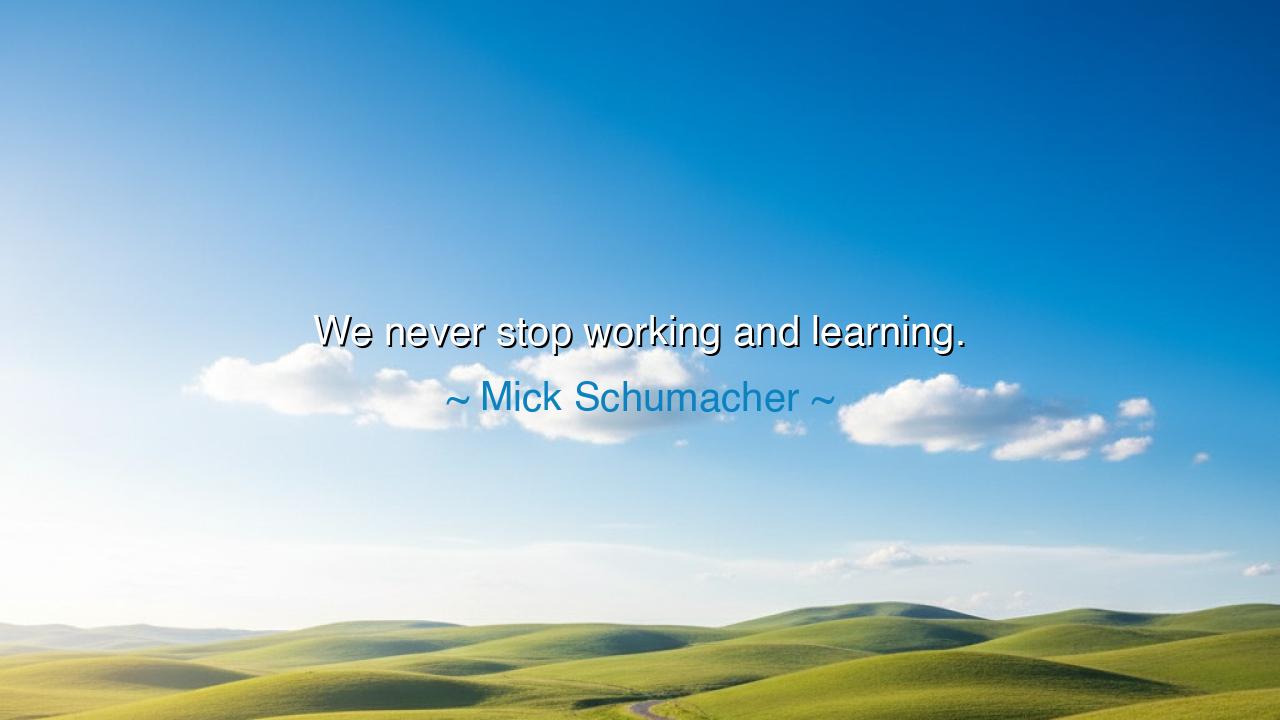
We never stop working and learning.






Hear the young charioteer’s vow carried on the roar of engines: “We never stop working and learning.” In this spare sentence, Mick Schumacher gives voice to a law older than the track and truer than the checkered flag: the road has no final mile for those who would master it. Practice is the prayer; revision is the rite. Between the green light and the finish lies a thousand tiny reckonings—brake points inched forward, lines widened by a palm’s breadth, doubts turned into data. To say we never stop is to choose pilgrimage over destination, craft over crown.
The origin of this creed is the garage as much as the grid. In motorsport, victory is a tapestry woven by many hands—driver, engineers, mechanics, strategists—each returning again and again to the loom. Overnight updates are stitched into the car; morning debriefs lay bare every corner taken and every gust misread. The paddock is a monastery of iteration, and learning is its rule. Here a driver’s humility is not a posture but a tool: telemetry is a mirror that does not flatter, and the stopwatch is a judge that cannot be bribed.
Mark how this wisdom echoes through the lineage from which the speaker comes. The father’s legend was not only speed, but relentless working—winter tests that outlasted daylight, corners taken a hundred times until the muscles remembered what the mind could barely name. The son inherits not merely a name, but a method: accept that today’s best is a draft, that tomorrow’s best will be born from its critique. Thus does family become a forge, and heritage a habit of refinement rather than a resting place.
Consider a tale from the annals of the track. A veteran, burned and broken, returned with scars that spoke like prophets. He did not rush the storm; he measured it. He rebuilt fitness lap by lap, rebuilt trust turn by turn, rebuilt courage by studying not only his rivals but himself. The comeback was not a single thunderclap; it was a weather pattern of patient learning, a thousand adjustments barely visible to the crowd. When triumph arrived, it was less a surprise than the flowering of a secret garden tended in long, quiet hours.
This teaching is not confined to circuits. The shipwright who planes a keel by hand, the surgeon who rehearses a suture, the poet who throws away ten lines to rescue one—all confess the same gospel. Working is the body’s devotion; learning is the mind’s. Together they make an altar where excellence may descend. If we stop, skill atrophies; if we never stop, skill becomes character, and character becomes fate. The ancients named this constancy virtus—strength through steady effort—far nobler than any single day’s applause.
Let the lesson be carved in simple stone: improvement is a loop, not a ladder. Drive, review, adjust, repeat. Praise the attempt, not only the outcome. Welcome correction as you would welcome fuel; honor failure when it pays its own tuition. If you grow weary, remember that motion itself is teacher: the hands that keep turning the wheel learn what the still hands never can. The work is long, but the road rewards the faithful with glimpses of mastery—those quiet moments when the line, the throttle, and the soul move as one.
Carry these practices like talismans: (1) Debrief daily—write what worked, what failed, and the smallest next change. (2) Instrument your life—find the “telemetry” of your craft (metrics, recordings, peer review) and read it without vanity. (3) Iterate tiny—change one variable at a time so cause and effect can speak clearly. (4) Train recovery—sleep, nutrition, and reflection are also working; a dull blade does not honor the wood. (5) Seek elders and rivals—learn from both; let admiration and competition sharpen you. (6) Teach as you go—explaining is advanced learning; your students will save you from your blind spots. Do these without ceasing, and you will make true the racer’s oath: we never stop working and learning—and in that unending road, we find the only finish line that matters, which is becoming worthy of the craft we love.






AAdministratorAdministrator
Welcome, honored guests. Please leave a comment, we will respond soon